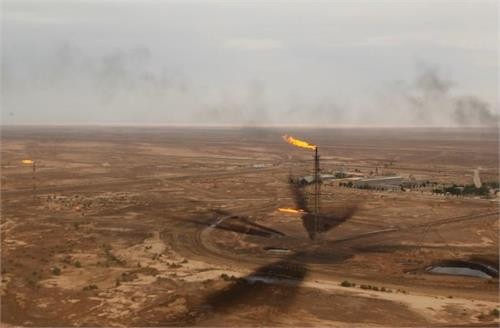Half-Century-Old Bangestan Reservoir Undergoes Development

TEHRAN, July 24 (Shana) -- Ten giant oil fields in Iran account for the bulk of Iran's oil production. But these fields are all in the second half of their lifecycle. Insufficient investment in them, over years, has left their recovery rate at a low level. As a result pressure fall-off in these fields is highly likely while they have great potential for higher production.
Ten giant oil fields in Iran account for the bulk of Iran's oil production. But these fields are all in the second half of their lifecycle. Insufficient investment in them, over years, has left their recovery rate at a low level. As a result pressure fall-off in these fields is highly likely while they have great potential for higher production. Ab Teimour which was discovered 50 years ago and its current output stands at 60,000 b/d is one of these fields. Bangestan reservoir of this field was one of 12 projects National Iranian South Oil Company (NISOC) offered for international investment under the new contractual framework (IPC) in Tehran.
Ab Teimour in Khuzestan province is located 25 kilometers west of Ahvaz. It is between Mansouri and Susangerd oil fields. Ab Teimour was discovered in 1961 after seismic test. A first well was drilled there six years later to prove the existence of oil. However, production from Ab Teimour began in 1991. Ab Teimour measures 23 kilometers in length and 6 kilometers in width. According to primary calculations, it is estimated to hold at least 15.2 billion barrels of oil in place.
Bangestan's current production stands at 60,000 b/d from 50 wells (29 wells in Ilam formation and 21 wells in Sarvak formation).
Ab Teimour is administered by NISOC, but its production operations are handled by Karoun Oil and Gas Production Company.
In the 130th meeting of the committee of reservoir consultants of National Iranian Oil Company (NIOC), the general plan for the development of Bangestan was discussed in three phases – natural depletion, artificial lifting and water and gas injection.
Given uncertainty of some data and in the light of completing reservoir data, development of Ab Teimour was designed in pre-phase and full-phase stages.
In the pre-phase stage, necessary data is gathered and pilot tests are conducted so that the development project would be updated and finalized. Based on the existing information, the pre-phase flow is forecast at 55,000 b/d and the full-phase flow at 110,000 b/d.
Over recent years, many foreign companies have expressed readiness to develop this field, but due to international sanctions, agreements were terminated. Recently, several companies including Russia's Lukoil agreed to submit the results of preliminary studies on this field to NIOC in the near future. Lukoil opened its Tehran office in April 2016; just months after sanctions were lifted on Tehran following the implementation of Iran's historic nuclear agreement with six world powers, known as the Joint Comprehensive Plan of Action (JCPOA).
Iran's Ministry of Petroleum has given the Ab Teimour data to several companies in order to examine various scenarios by rivals. Each company has submitted a separate proposal to NIOC. Indonesia's Pertamina has suggested 250,000 b/d production and Lukoil 150,000 b/d. Denmark's Maersk plans different scenarios including 200,000 b/d, 300,000 b/d and 450,000 b/d production. Maersk's 450,000 b/d plateau could remain for four decades and this company must operate the field for a longer period of time. Such output would be reached in case the recovery rate of Ab Teimour is enhanced from the current 2.27% to 12%.
Technical studies by Iranian experts show that the field's output could be increased up to 95,000 b/d. Ab Teimour is estimated to contain 15 billion barrels of oil in place and so far 315 million barrels has been recovered from the Bangestan reservoir. Near this reservoir is erected a production unit with the rated capacity of 55,000 b/d, a desalting unit with the capacity of 55,000 b/d and a gas pressure booster unit with the nominal capacity of 20 mcf/d.
Experts and specialists at NIOC have processed and interpreted 3D seismic test data and identified a new reservoir structure which contains around 2 billion barrels of oil in place.
As the Bangestan reservoir pressure and the wells' stream pressure change, artificial lifting of Ab Teimour in the Bangestan reservoir was planned. This project is now in its final stages and the flow of oil wells from Ab Teimour will be stabilized after artificial lifting system is installed.
Courtesy of Iran Petroleum